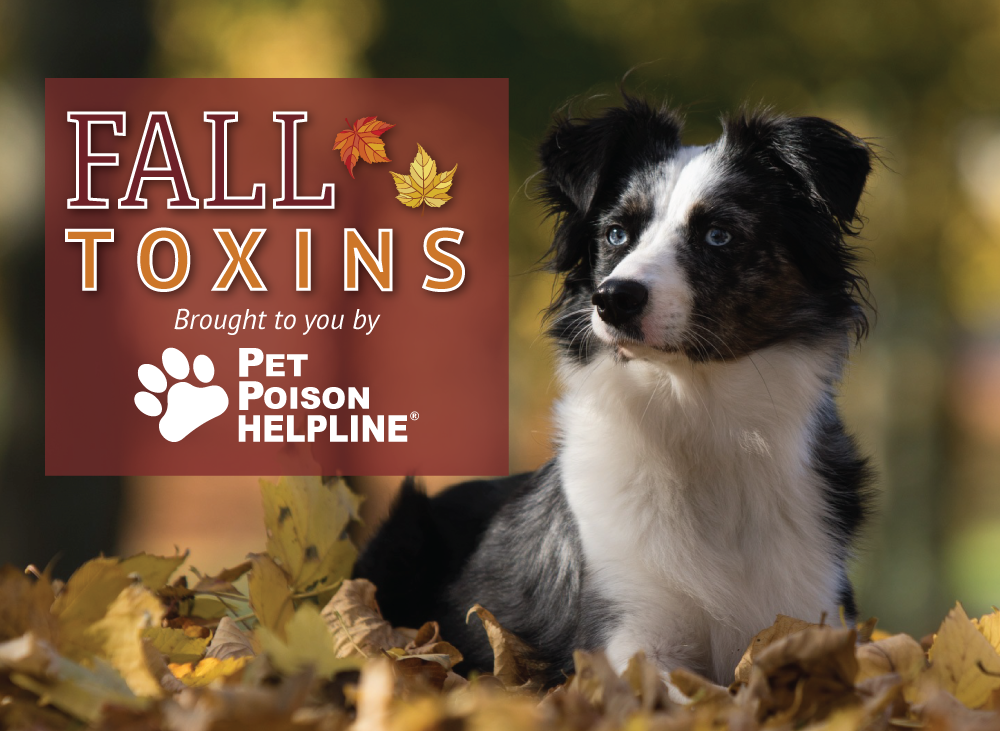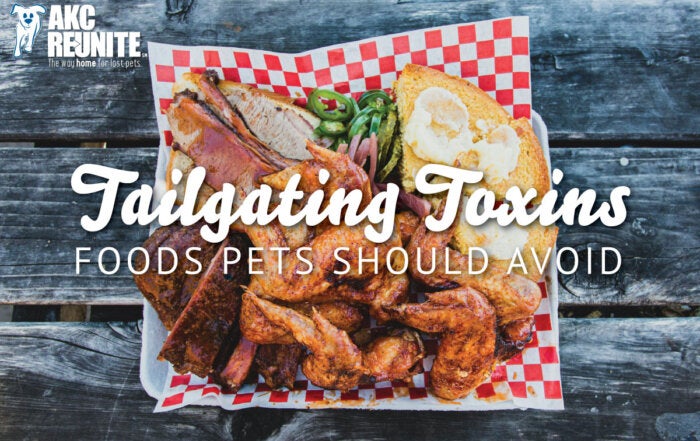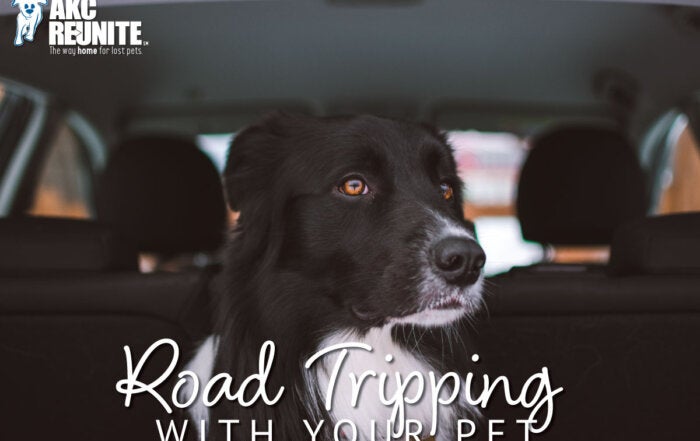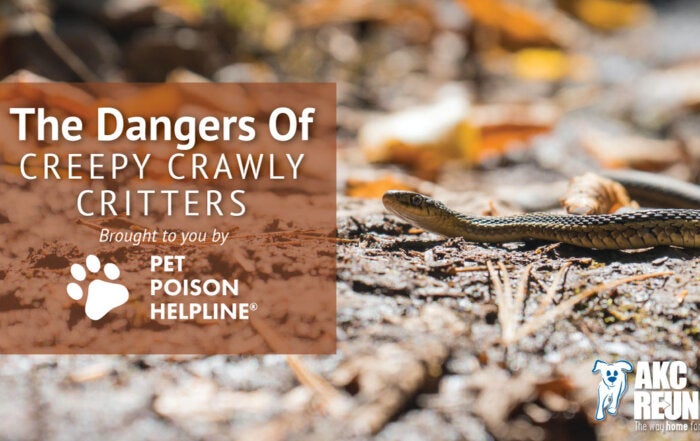Brought to you by Pet Poison Helpline & AKC Reunite
Autumn/Fall items can pose a threat to the safety of your pets if ingested. Here is the list of seasonal products that should be kept away from pets.

Pumpkin Spice
Pumpkin spice foods and drinks are a huge trend in the fall! These products are usually flavored with a mix of cinnamon, ginger, nutmeg, cloves, and allspice. While small amounts of these spices added to flavor foods usually will not be toxic to pets, ingesting large amounts of these fall spices, can cause serious illness.
Cinnamon can potentially cause vomiting, diarrhea, lowered blood sugar, irritation of the mouth and lungs, and possibly changes in heart rate and issues with the liver. Nutmeg contains a toxin called myristicin, and toxicity can cause symptoms including hallucinations, disorientation, increased heart rate, high blood pressure, dry mouth, abdominal pain, and possibly seizures. Ingestion of large amounts of ginger can cause stomach upset and lethargy. Cloves and allspice both contain a compound called eugenol, which can cause liver toxicity in cats.
Seasonal Foods
While pumpkin spice flavored foods are extremely dangerous, there are other toxicity concerns if a pet ingests a food or drink with – or without – these flavors. The caffeine in flavored coffee can raise blood pressure and cause cardiac arrhythmias and even tremors or seizures. Ingesting pumpkin spiced beer or other alcoholic drinks can lead to slow respiratory rate, tremors, seizures and even coma and death. Rich baked goods may contain other toxic ingredients such as raisins, deadly xylitol, macadamia nuts, or chocolate.
Red Maple Leaves
Horse lovers, beware! As little as one pound of dried maple leaves blowing into your horse’s pasture can be toxic. When ingested, these leaves result in a severe hemolytic anemia causing red blood cells to rupture, which can lead to weakness, pale gums, an elevated heart rate and shock.

Mothballs
Mothballs typically contain either paradichlorobenzene or naphthalene. While the old fashioned mothballs (naphthalene) are often considered more toxic, both can be deadly. Symptoms include vomiting, severe abdominal pain, tremors, weakness, possible kidney or liver failure, and severe abnormality of your pet’s red blood cells.
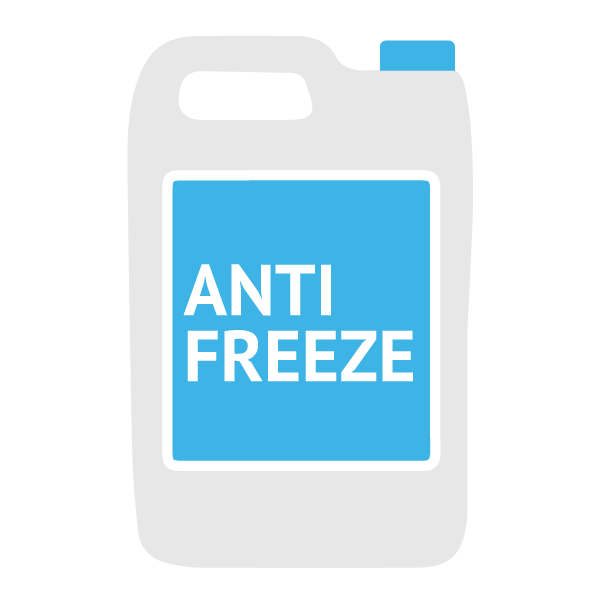
Antifreeze
As little as one teaspoon of antifreeze in a cat or a tablespoon or two for dogs, depending on the size of animal, can be fatal. Immediate treatment with an antidote is vital. Signs of early poisoning include acting drunk or uncoordinated, excessive thirst, and lethargy. While signs may seem to improve after eight to twelve hours, internal damage is actually worsening with crystals developing in the kidneys, which leads to acute kidney failure.
Compost Bins or Piles
Compost piles have the potential to contain tremorgenic mycotoxins, which are toxic to both pets and wildlife. Even small amounts ingested can result in clinical signs within 30 minutes to several hours. For the safety of all animals, keep dairy and meat products out of the compost and make sure the area is fenced-off to keep pets and wildlife away.
Mushrooms
While most mushrooms are generally non-toxic, certain types can be very dangerous. One of the most dangerous is the Amanita phalloides or death cap mushroom which is found throughout the United States, but hard to identify. It is wise to consider all ingestions of unidentified mushrooms as toxic until proven otherwise. Symptoms include vomiting, diarrhea, abdominal pain, depression, tremors, and seizures, with liver and kidney damage occurring later.

Mouse and Rat Poisons
“Rodenticides also pose the potential for relay toxicity,” said Dr. Ahna Brutlag, assistant director of veterinary services at Pet Poison Helpline. “In other words, if your dog eats a large number of dead mice poisoned by rodenticides, they can experience secondary effects.” Because there are several different types of chemicals in mouse and rat poisons, all with different active ingredients and types of action, it is imperative to keep your pets away from all of these potentially dangerous poisons.

Pet Poison Helpline is a 24/7 animal poison control service available for pet owners and veterinary professionals who require assistance with treating a potentially poisoned pet. Pet Poison Helpline has the ability to help every poisoned pet, with all types of poisonings. Normally $85 per incident, with AKC Reunite you can plan ahead and subscribe your pet to this life-saving service for only $15 for the lifetime of your pet. Should your pet ingest something potentially poisonous, contact AKC Reunite at 800-252-7894 and we will verify your membership and connect you to a toxicology expert to help you and your pet FAST.

